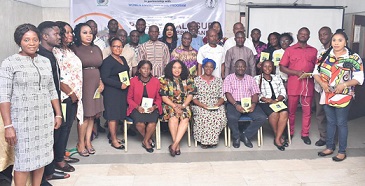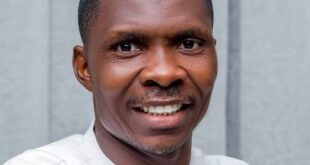By Paul Williams
The socio-economic effect of land grabbing and forest degradation on women, impacted communities and groups in the South-South geo-political zone of Nigeria, on Monday became the main agenda of a gathering of representatives of civil society groups, government ministries and agencies, legislative arm of local councils, communities and the media in Rivers State.
Gathering under the aegis of Kebetkache Women Development & Resource Centre, in partnership with Women Environmental Program, at an event tagged: ‘Policy Dialogue on Land Grabbing and Forest Degradation in South-South Nigeria,’ the stakeholders agreed on the urgent need for social action and policy framework regulating land grabbing and deforestation in the region.
The event, which was organized to present a ‘Report on Land Grabbing, Reflections, Concerns and Implications for Women’s Livelihoods,’ ended up revealing the harrowing impact of land grabs on communities, particularly women, in the Niger Delta.
Executive Director of Kebetkache Women Development & Resource Centre, Obonganwan Emem Okon, said the policy dialogue, which examined land grabbing and its impact on women’s livelihood in Rivers State, is a component of the ‘Forests for a Just Future’ programme, of the Green Livelihoods Alliance (GLA) project, being implemented by the Women and Environment Program (WEP) and Kebetkache Women Development & Resource Centre.
She noted that the report has “revealed what community members, particularly the women, are suffering because of land grabs. And what is ‘Land Grabs?’ That governments and corporations are taking community lands and leaving the communities poor and suffering untold hardship.
“So, companies take the land, and part of the very sad story is that they just go and fence round the land, even when people are still living there. And communities are not well compensated for this land that has been taken away from them,” she said.
Okon lamented that “In the Niger Delta, lands are being taken for oil and gas extraction. When this happen at the initial stage, community members expect development. ‘Development’ to our understanding is that we will have access to education, water and all the social services. But over the past decades, we don’t have these, and the lands are gone, and people are not paid.
“What we are talking about is that there should be a reconsideration of the way land is taken away from communities, and measures should be adopted to alleviate the sufferings of the people.”
Reviewing the report, Ebiaridor Kentebe, programme manager, Environmental Rights Action/Friends of the Earth Nigeria, noted the issues around land grabbing in Rivers State, and stressed that “women are the most impacted when it comes to issues around the environment.”
According to the study, which established cases of land grabbing in Eleme, Etche, ONELGA, Emohua, Eleme, Khana, Gokhana, Obio/Akpor etc, “land grabbing is having a pervasive impact on women livelihood and forest resource base in the state.”
Kentebe pointed out that in Rivers State, and in the Niger Delta, “Most of the land has been taken over for resource purposes. And that also includes issues where oil companies have taken over land in communities, where companies have also taken over some land for other purposes of development.
“And this has created a huge impact on women, because women are in the forefront of surviving or supporting the husband’s business and also supporting the home. Women are the most vulnerable, and it is important that we look at how to improve their lot in terms of development.
“Government should first try to create a law that reduces the manner in which land is being grabbed by companies and also by individuals. If that law is put in place, it could be reasonable enough to also curtail and reduce the impact that land grabbing is having on families. You will also agree that communities where land is being grabbed, who are farmers, have been deprived of access to their farmlands, and that will also bring about shortage of food in the state,” he said.
The report also identified government as “the chief enabler of land grabbing with instrumentality of the Land Use Act of 1978,” adding that “other enablers of land grabbing (multinational corporations, financial investors and private individuals) relied heavily on government to grab land from the original peasant farmers who owned the land.”
Permanent Secretary of the Ministry of Women Affairs, Barr Mrs Uchechukwu Uriri, who was the most senior government official at the event, disagreed with the idea that government is the “biggest land grabber.”
She said, “Land grabbing is an illegal activity, and the government cannot be seen to do illegality. So government is not the greatest land grabber. Government acquires land legally, following due process.
“The due process cannot be detrimental to the people because these are legal machinery put in place, checks and balances. It is there in every organization, in every civilization. Where you don’t have checks and balances, chaos takes over, then the essence of governance fails,” she said.
The permanent secretary however noted that “it is quite unfortunate that women are adversely affected,” adding that “the ministry will collaborate to see ways of mitigating the negative effects of land grabbing on women.”
For a community member from Obelle in Emohua Local Government Area, Henry Eferegbo, who is also a councilor, however, it was a tale of woe.
He said, “The (Nigerian) Army grabbed our land, they fenced it up. The Army that is in Elele Barracks. That barracks comprises of Obelle, Elele and Elele-Alimini communities.
“They took a vast land. The Obelle side, you cannot quantify it, is so big that they have deprived the farmers from Obelle from farming on that land. And you would be surprised (to know) that development hasn’t gotten to that land. They have fenced it off, and the local people, my people, my community, my family, pay the Army to farm on the land that God has given to them.
“Even the palm fruit, which is a natural resource for my people, the Army now took over. They now sell to the people and we pay them money.
“What you have seen now in my community is hunger, poverty, hardship, because our source of livelihood has been taken away,” he said.
Another community member, January S. Igoma, who is palace secretary to the paramount ruler of Aminigbok Community, Emughan Clan in Abua/Odual Local Government Area of Rivers State, frowned at the value placed on such government or IOC-acquired land.
“The position of my community is very clear. We cannot stop the government from carrying out development, and the IOCs must at one point or the other has access to land where oil is found.
“But the value which the land is being paid for is at issue. We can’t have a plot of land in Asokoro (Abuja), in Banana Island in Lagos selling for over one billion Naira, and you come to the Niger Delta, where you have oil, where Shell has a flow station, oil well and pipeline on land, and then what is the value ascribed to this land?
“So, we are advocating that the land in the Niger Delta used for oil activities, should be one million times the value of land in Asokoro or Banana Island. Because, this is where the resources of the country are being tapped, and everyone in the country benefits,” he said.
Igoma said it is unfortunate that “no community in the region gets up to N50 million for a hectare of land, even if it is for rent or outright acquisition.” PH Mundial – Port Harcourt Online Newspaper News Across The Region
PH Mundial – Port Harcourt Online Newspaper News Across The Region





